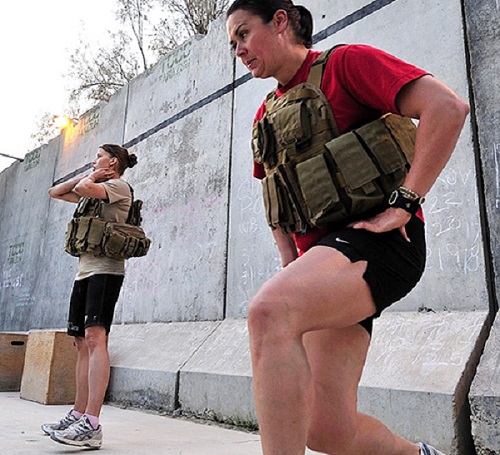By Devon Atherton –
When it comes to the care and support of ill and injured members, the Canadian Army (CA) believes that its soldiers deserve the highest level of service.
This is why, under a new directive developed by CA Personnel Policy, a standardized approach to supporting and caring for soldiers throughout the organization aims to ensure that soldiers have access to the best support services at the most appropriate time.
Maj. Jeff Manley, a policy analyst, had the lead in developing the new directive for chain-of-command review and then oversaw its implementation.
Related Content
Complicated system blocks transition path of injured soldiers: DND Ombudsman
Ombudsman decries delay of benefits for medically discharged soldiers
For Maj. Manley, this required a great deal of research and networking.
“I wanted to take all of the good information out there on soldier care and formalize it,” he said. “It’s important to focus on the successes of the Army and use them as a base for our best practice guidelines. What we have developed here is a reference for leadership and members to make the best decisions possible regarding the well-being of the troops.
The directive has pulled examples of best practices performed within the CA and standardized them into five lines of effort. These are:
- Education surrounding soldier support
- Early intervention for ill and injured members
- Seamless transition into and out of Army units
- Continuous engagement between units and ill and injured members
- Dignified departure
The directive is also aimed at increasing cooperation between Army units, their injured members, and the CA soldier support system administered under Joint Personnel Support Units (JPSUs), which help members recover, return to duty or transition out of the military.
The JPSU system was established in 2008 to care for soldiers ill or injured after serving in Afghanistan. The eight regional JPSUs and JPSU Headquarters collectively make up a substantial unit in the Canadian Armed Forces (CAF) with 300 staff and 1,400 clients.
While initially the JPSU system was meant to provide ongoing soldier support for members returning from Afghanistan, it now serves the CAF’s ill and injured more broadly, with over 24 Integrated Personnel Support Centres (IPSCs), which are administered by the regional JPSUs.
“When a member becomes ill or injured and is unable to perform their regular duties for more than six months, unit leadership will consider posting him or her to a JPSU based on the advice of medical staff,” Maj. Manley explained.
Before the new directive, the time taken to refer injured members to JPSUs sometimes complicated the recovery process.
“We were seeing that sometimes intervention didn’t come at the right time,” said Maj Manley. “In some cases, this would mean we would decrease the chance for a member to achieve a full recovery. Addressing problems at the earliest practical point will provide a better chance of success.”
Maj. Manley also added that there is a fundamental role for Army units in the continuous and comprehensive support of their ill and injured members.
“We don’t want our people to believe that a posting to a JPSU is the end of their connection to their unit and the Army,” he said. “The design of the system is to give injured members time and space to recover. But maintaining a relationship with units has actually been found to improve recovery and increase morale.”
Because of this, the directive focuses on setting out standard practices for the transition and, ideally, reintegration of injured CA members between IPSCs and their units.
The Commander of the Canadian Army, Lieutenant General Paul Wynnyk, emphasized that “regardless of whether they are serving with their unit or posted to a JPSU, I want our ill and injured soldiers to know they will always be top of mind with their units, and their Army family will be looking out for them.”
It has long been believed that a Unit’s contact with ill and injured members and their inclusion in appropriate unit activities plays a significant role in their recovery at JPSUs. Now, the CA is seeking to make this type of engagement a standard operating procedure in the support of its ill and injured. Maj. Manley said this means making sure that leaders and their soldiers approach JPSU postings with a deliberate, mutually supportive strategy in order to make informed decisions, and also to make sure that lines of communication remain open and honest.
“Throughout the Army, we’ve seen successful and unsuccessful examples of reintegration. What we hope now is that, by following the steps outlined in this directive, we’ll be seeing more positive examples than otherwise,” he said.
If a member needs to be released from the CAF in consultation with medical staff, this directive also outlines procedures for members to depart with dignity. Mr. Wayne Quinn, JPSU Operations Officer, explained that a great deal of consideration goes into member release.
“Health considerations made before an ill or injured member is released from the CA come down to a decision by Canadian Forces Health Services,” said Mr. Quinn. “Medical assessments are performed in order to decide on the best options for members going forward. These assessments are based on biological, psychological and social components, as well as a member’s access to treatments and health services.”
The new support directive also reinforces that Army units have an important role to play in the departure with dignity process. This means that releasing members are accorded appropriate departure ceremonies with unit attendance in order to demonstrate the CA’s respect and appreciation for the service and sacrifices of their former soldier as he or she transitions back to civilian life.
“Knowing your soldiers and promoting their welfare is one of the first principles of Army leadership and we take that seriously,” Maj. Manley added. “We want to empower our leaders to make the best decisions possible for our people by setting one high standard for soldier support.”
Devon Atherton is a member of the Canadian Army Public Affairs
